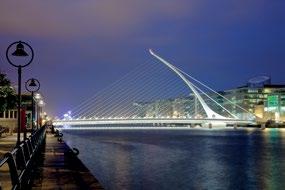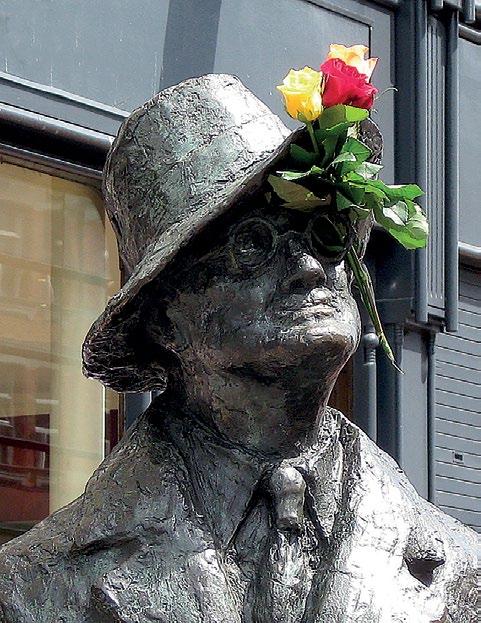
9 minute read
Dublin dossier

Pat Keenan on happenings in and around the capital
let his bones rest in exile, a place to visit and reflect on this sad era of our history. I have come to share his thoughts that when Ireland became independent, we were still a far way from being free. In Conversations with James Joyce (published by The Lilliput Press), again his friend Arthur Power quotes him: ‘..since the Free State came in there is less freedom. The Church has made inroads everywhere.. and I do not see much hope for us intellectually. Once the Church is in command she will devour everything.’

Ireland's religious censors rejected him and when he died the issue of repatriation was raised by Nora. Ireland's then Minister for External Affairs, Seán MacBride, who had facilitated the supposed repatriation of W.B Yeats, said no and hand wrote ‘No Action Required’ on the repatriation documents, after all, in 1949 Ireland was a Catholic state.
Book of Kells shelved until March
Last year this Dubliner became one of the more than a million people who visited the must-see for tourists attraction, but not so urgent for the average Jackeen – ‘ah sure we know it's there’. Well, for a while, I'm afraid not.
Talbot St James’ Joyce sculpture A motion to have the remains of James Joyce and his wife Nora Barnacle repatriated to Ireland was recently put forward by two Councillors of the Dublin City Council, anticipating the centenary in 2022 of the publication of Ulysses. The Joyces are buried with their son and his son in Fluntern Cemetery in the Zürichberg district of Zürich. And it is right and proper that they should continue to rest there. After all James and Nora self-exiled themselves from Dublin for many reasons but Dublin was then and always would be his core obsession. Talking to his friend, the artist/art critic Arthur Power he said: ‘For myself, I always write about Dublin, because if I can get to the heart of Dublin I can get to the heart of all the cities of the world. In the particular is contained the universal’. So whether he was living in Zürich, Paris, Rome or Trieste or is dead in Zürich, his books are now freely available in Ireland, no longer banned, no longer regarded as obscene. Joyce is quintessentially Dublin, born, bred, educated and his writing source are the odd wits and varied characters walking its streets, and it is now and forever the city where he is fondly remembered by natives and 'runners-ins' from all round the world every Bloomsday. Keep in mind, the Dublin he left was not the free and easy Dublin we love and pride ourselves on today and this is why we should The Book of Kells is presently not on public display in Trinity College Dublin until March 2020. due to conservation works on the display area. A full colour replica will be put on display in its place in the library Long Room, and there will be a 15 per cent discount on tickets while the manuscript is in storage. Eight Irish novels nominated for Dublin Literary Award Eight novels from Ireland are among 156 books nominated by libraries around the world for the 2020 International Dublin Literary Award. They are A Ladder to the Sky by John Boyne, Milkman by Anna Burns, The Woman in the Woods by John Connolly, Begotten Not Made by Cónal Creedon, Orchid and the Wasp by Caoilinn Hughes, Skin Deep by Liz Nugent, Travelling in a Strange Land by David Park and Normal People by Sally Rooney The book that received most nominations was There There the first novel by a Cheyenne and Arapaho author Tommy Orange, exploring the range and depth of modern Native American Let Joyce’s bones rest in exile
Senior Times l January - February 2020 l www.seniortimes.ie 39

Peter Rock and dad Dickie at The Exchequer’s 10th anniversary
40 Senior Times l January - February 2020 l www.seniortimes.ie life. It was nominated by 13 libraries in Canada, Greece, Ireland, and USA. With the winner receiving €100,000, this award is the world’s most valuable annual prize for a single work of fiction published in English. Nominations include 50 novels translated into English and those nominated by libraries from 40 countries worldwide. The winner of the prize in 2019 was American author Emily Ruskovich for her first novel, Idaho. All the novels nominated for the Award are available for readers to borrow from Dublin’s public libraries. The full list of 156 titles has been published in a free newsletter, and all details are also on the newly revamped Award website at www.dublinliteraryaward.ie. Most libraries throughout the country should be able to provide any of these books. The shortlist will be published on April 2 and the Lord Mayor of Dublin will announce the winner on June 10, 2020. Gastro pub Celebrates ten years Was a time when if you asked for something to eat in a pub a smart Alec barman might reply, definitely rhetorically: "what do you think this is, a restaurant?’ When The Exchequer at 3-5 Exchequer Street opened 10 years ago, we were new to the idea of the 'gastropub' and as for the barman to be retitled 'mixologists' - I'd say that particular term would have carried a more worrying thought for your average 'glass of plain' drinker. The Exchequer was one of the first and we were certainly new to the phenomena of the '6 Nations Sausage'. That was part of the revolution, made from the ingredients of all Six Nations, Irish Whiskey, Scottish Barley, English mustard, Welsh leeks, French garlic and Italian sun dried tomatoes. On Hallowe'en last, The Exchequer celebrated their first decade and on the night The Peter McVerry Trust, their chosen charity over the years, received a donation from a percentage of all food sales and donations from staff and customers. ‘The Exchequer has become exactly the Gastropub we wanted to create,’ said owner Peter Rock. ‘We’re open from midday till late, and although just steps from the busiest streets in Dublin, it’s an oasis of the very best food and drink, in charming surroundings.’ Peter's dad, showband era legend Dickie Rock was on hand to help blow out the birthday candles and he'd know a thing or two about that. Dickie, now 82, announced his retirement late last year. He spends half the year in his second home on the Costa Del Sol where you will see him run along the beach everyday. I have seen him many times running the beaches around Howth. I bet he'll still do a few gigs.
Dermot Kennedy’s aloft homecoming tour
‘Are you related to Dermot?’ - the young lady had to raise her voice into my inclined ear. The place was still buzzing with a full-on sound following the 'Homecoming Tour of Dermot Kennedy' at Aloft Hotel Dublin in the heart of the Liberties. I fully understood why she asked, I was probably the oldest person there, sipping my pint absorbed in thought.
Turns out she was a young journalist admirably seeking a nice background story - alas for her, I was not related. The venue was the hotel's WXYZ bar on the top floor surrounded with a spectacular view across Dublin, even out to the Wicklow mountains.
When singer/songwriter Dermot Kennedy was 16 (he's now 28), his dad would drive him from Rathcoole in the outer suburbs of Dublin to busk in Grafton Street. He believes busking developed his sound, described by New York based GQ magazine as ‘a rich, reverbant voice’- I, and my dictionary was unfamiliar with the word 'reverbant' - now after his performance, I know what it means - reckon it derives from 'reverberate' and it naturally occurs in his voice.

Europe, Australia and the US, prestige places like the Coachella Stage – the one that draws the largest crowds at the Empire Polo Club in Indio, California.
The Liberties is one of the oldest parts of the city and today it is renovating into a truly trendy area. And a reason why Marriott would locate Aloft Dublin here at Mill Street. There are currently only four Aloft hotels in Europe, all are in key city-break destinations - Dublin, London, Liverpool and Madrid. They plan two more openings soon in Munich and The Hague. Aloft is Marriott International's new generation 'always on' hotels for 'music fans and tech-savvy travellers - an incubator of new ideas.' It's a far cry from the days of ‘Biddy Mulligan the pride of the Coombe’.
Sowing the seeds of Dracula In Marsh’s Library
As part of celebrating Bram Stoker Festival last year, I walked in the footsteps of the Dracula author, around the side of St.Patrick's Cathedral into St.Patrick's Close, through the archway's iron gate, up the steps through the
Stena Estrid..next stop Dublin

Marsh’s Library: did it inspire Bram Stoker?
small sunny and shaded garden into Marsh's Library. Inside it is more or less unchanged since the day in 1866 when an 18 year old student from Trinity College first signed the visitor's book: 'Abraham Stoker' and he wrote in his address of the time as 4 Orwell Road, Rathgar. The same galleys of dark old oak shelves, stacked with all the same books, and we know from the register, every book Stoker took down to study, including old maps of Central Europe from where Dracula would begin his nightmarish journey. At the end of the gallery, the rather daunting three cages with wire doors where readers would be locked-in while reading rare and precious books. Narcissus Marsh, Church of Ireland Archbishop of St.Patrick's, who had this, the first public library in Ireland, built was concerned about the possibility that some of the public might not be entirely trustworthy. Other places across Europe would chain readers to the walls but Marsh came up with the cages solution. The scull in one of the cages is not one of these miscreants, it is a cast of the skull of Stella (Esther Johnson), the companion of Gulliver’s Travels author, Archbishop Jonathan Swift. Incidentally Swift's scull cast is in the Cathedral next-door. Remarkably both were done at the same time (1835) by Oscar Wilde's father Sir William Wilde, a well known and leading eye and ear surgeon in Dublin. New Stena DublinHolyhead ferry begins service next year Stena Estrid, first of five new Stena vessels built by the AVIC Weihai Shipyard in north-western China, is on her six-week long journey to its new home on the Irish Sea, where it will soon begin service on the Dublin to Holyhead route. Stena Line CEO Niclas Mårtensson said that the delivery of Stena Estrid will provide ‘a more environmentally sustainable way to travel with more efficient loading and unloading operations, increased freight capacity and the best Scandinavian quality, style and design, including the Hygge Lounge and the latest upgrade of our premium area Stena Plus.’ The new ferry will provide a freight capacity of 3,100 lane metres and the space for 120 cars and 1,000 passengers and crew. Senior Times l January - February 2020 l www.seniortimes.ie 41









